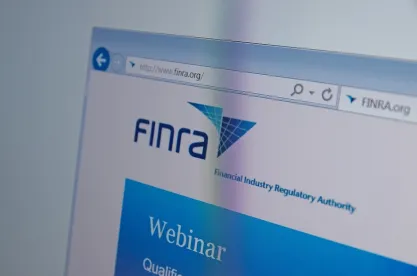FINRA punctuated its annual post-New Year’s Report on FINRA’s Examination and Risk Monitoring Program (the “Report”), by including a new target category “Financial Crimes.” The inclusion of this category is noteworthy not only for its newness but also because FINRA, as a non-governmental self-regulatory organization, does not have authority to prosecute criminal activity.
The annual Report, colloquially known as FINRA’s priorities letter, is designed to provide insight on FINRA’s examination and risk monitoring program. As such, it acts as an up-to-date, evolving resource for member firms that identifies relevant rules relating to specific topics, highlights key considerations for compliance programs, summarizes noteworthy findings, outlines effectives practices observed through FINRA’s oversight activities and provides additional resources that may be helpful to member firms in reviewing their supervisory procedures and controls. The 2023 edition is comprised of five sections: (1) financial management, (2) Market Integrity, (3) Communication and sales, (4) Firm Operations and the newly added section on Financial Crimes. It is this section that has generated a good deal of attention.
The Financial Crimes section is itself divided into three subtopics: Cybersecurity and technology governance, Anti-Money Laundering, Fraud and Sanctions; and Manipulative trading. In its Cybersecurity section, the Report reminds member firms that cybersecurity remains one of the principal operational risks facing broker-dealers and provides some key considerations to help in developing and maintaining reasonably designed cybersecurity programs. The Report also highlights a number of effective practices in cybersecurity such as completing regular back ups of critical data, regularly assessing the firm’s cybersecurity profile based on changes in the firm’s size and business model, and implementing systems that can scan outbound email text and attachment to identify and potentially block sensitive customer information or confidential firm data. In its Anti-Money Laundering section, the Report makes note of relevant FINRA rules, such as Rule 3310(a), which requires that member firms establish and implement Anti-Money Laundering policies and procedures that can be reasonably expected to detect and cause the reporting of suspicious transactions. Last, the Report provides pertinent regulatory obligations and considerations on the newly reported topic of Manipulative Trading – an issue that the Report also noted as an “emerging risk area” as discussed below.
Most notably, FINRA uses the Financial Crimes section of the Report to identify three emerging risk areas:
1. Manipulative Trading in Small Cap IPOs
According to the Report, FINRA, NASDAQ and the NYSE—all three prominent voices in the securities regulatory space – have recently observed that initial public offerings for certain small cap, exchange listed issuers may be the subject of a variety of manipulation schemes – similar to “ramp and dump” operations. More specifically, FINRA has observed significant unexplained price increases on the day of or shortly after the IPO of certain small cap issuers. The price increases appear to be associated with trading by apparent nominee accounts that invest in small cap IPO and subsequently engage in apparent manipulative orders and trading activity. To help prevent the increase of such phenomena, FINRA encourages member firms to review Regulatory Notice 22-25 and highlights certain observations that it believes to increase the risk of manipulative trading – inadequate due diligence, inadequate ongoing monitoring and reporting of suspicious transactions and the inadequate handling of FinCEN information requests are just a few of those observations.
2. Sanctions Evasion
The Report also notes that the Financial Crimes Enforcement Network (“FinCEN”), a bureau of the U.S. Department of the Treasury, issued an alert (FIN-2022-Alert001) advising increased vigilance for potential Russian Sections Evasions Attempts, warning financial institutions of efforts to evade sanctions issued by OFAC and other U.S. imposed restrictions implemented in connection with Russia’s actions on Ukraine.
3. ACATS Fraud
Lastly, the Report notes that FINRA has observed an increased number of fraudulent transfers to customer accounts through Automated Customer Account Transfer Services (“ACATS”), a system that facilitates the transfer of securities from one trading account to another at a different brokerage firm or bank, in which a bad actor will use the stolen identity of a legitimate customer to open an online brokerage account. Then, shortly after opening this account, the bad actor submits an ACATS requests to transfer assets out of an account the legitimate customer holds at a different firm. Once the ACATS request is processed and the legitimate customer’s assets are transferred, the bad actor attempts to move the customer’s assets to an external account at another financial institution by either transferring the assets, liquidating the securities or a portion of the securities transferred, or purchasing additional securities using the transferred cash and then transferring those securities to an account at another financial institution.
To prevent further ACATS Fraud, FINRA advises member firms that offer online account opening services to confirm that their reviews of red flags of new account fraud are incorporated into their customer onboarding process.
Conclusion
The Report is designed to act as a resource for member firms to take note of relevant FINRA rules and financial regulations as applicable to the topics discussed. This year, FINRA has taken a new direction and recategorized its Anti-Money Laundering and Cybersecurity topics, previously categorized under “Firm Operations,” under the brand new section of “Financial Crimes.” It has also added the new topic of “manipulative trading” as both an emerging risk to take heed of, and a topic worth expounding upon apart from FINRA’s observation of manipulating trading as it pertains to small cap IPO’s. This addition of the Financial Crimes section suggests that FINRA, while possessing no prosecutorial power itself, is looking to broaden its mandate so as to take a more active role in maintaining the integrity of the financial markets.



 />i
/>i

